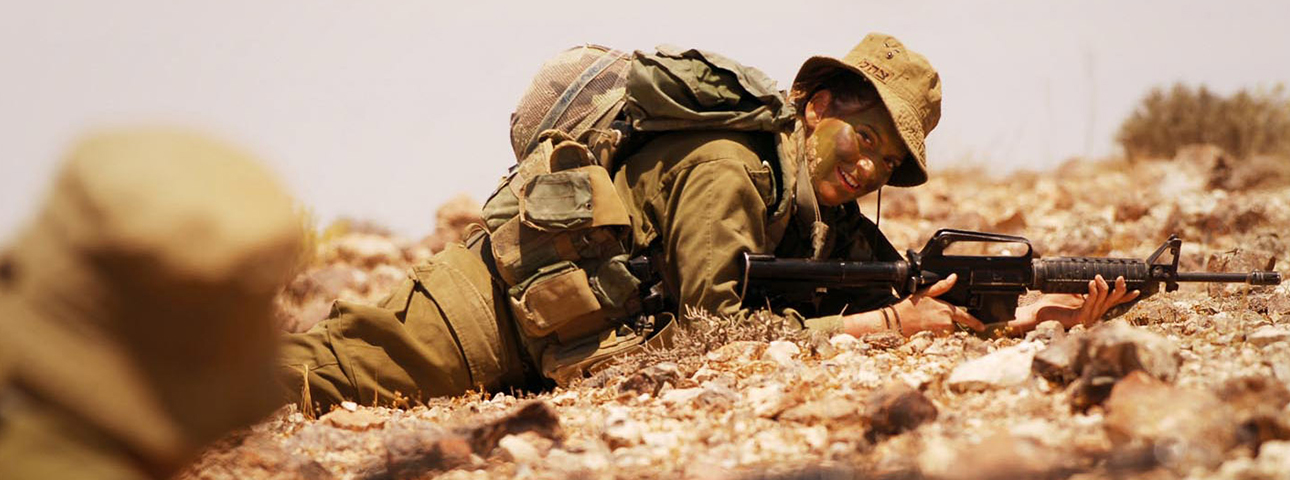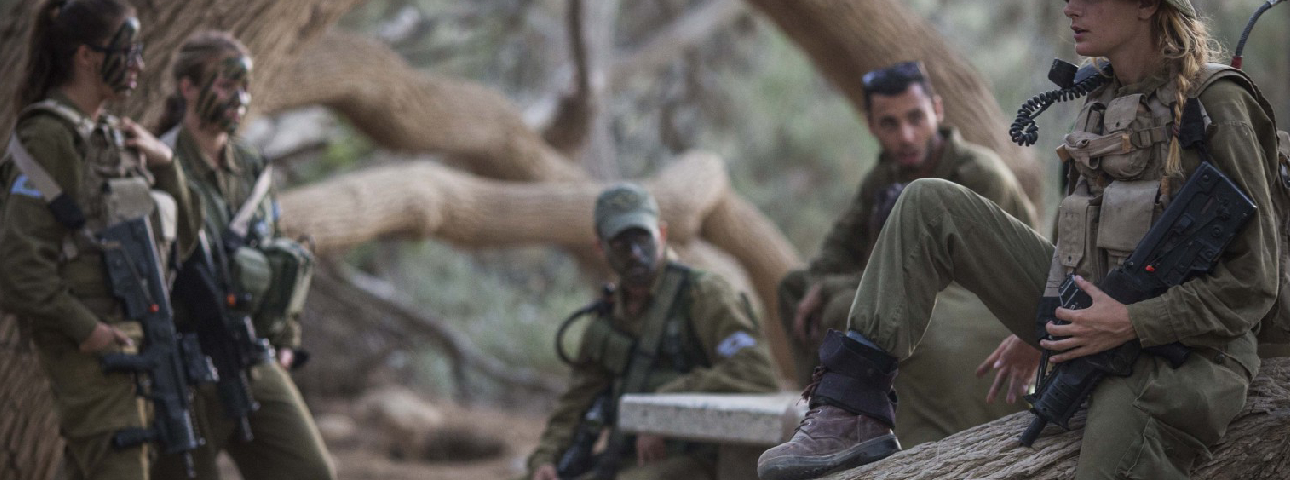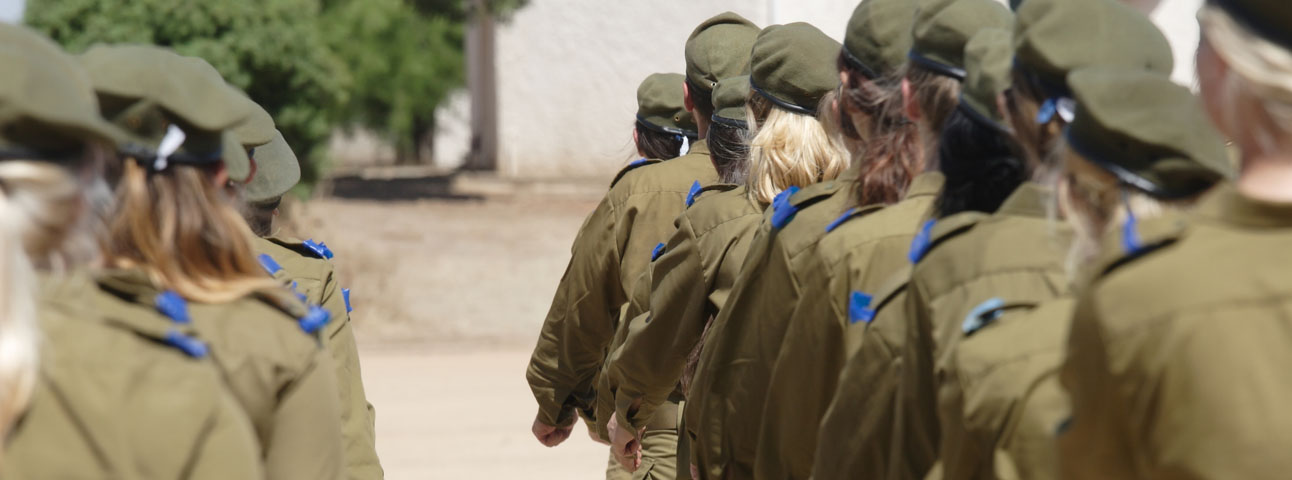Women in the IDF: The Challenge of an 'Integrated' Army

Alongside its longstanding security challenges, the state of Israel has also been grappling in recent years with an intense controversy over the service of women in the Israel Defense Forces (IDF). The dispute recently came to a boiling point with the amendment of the “Joint Service Order,” which sets out guidelines for women’s military service alongside Orthodox men who observe, inter alia, religious restrictions on interacting with their female fellow-soldiers.
The IDF is one of the only armies in the Western world in which women are drafted to military service by law. Women have served in the Israeli army ever since its establishment in 1948. At first they served mainly in administrative jobs or as instructors in a variety of fields, but they gradually moved into operational positions due to both a shortage in combat soldiers and demands of Israeli feminist groups. According to Haaretz, the number of female combatants has more than doubled in recent years. In 2012, 3 percent of women in the IDF served in combat positions. Four years later, in 2016, the percentage more than doubled to 7 percent—and it will likely continue to rise.
A major milestone came in 1995, when the High Court of Justice ruled that women were entitled to both formal and substantive equality in their military service—opening up combat positions to women, first to serve as pilots and then as combat soldiers in various prestigious units. The possibility of expanding the integration of women into additional combat roles is currently being examined.

Alongside the expansion and diversification of opportunities for women in the IDF, the military has also seen a significant rise in the number of religiously observant (Orthodox) soldiers, many of whom serve as officers and members of elite units. Current data on the IDF officer training course indicate that out of the 392 cadets who completed the course in [2018], 40 percent defining themselves as “religious.”
These observant male soldiers often refuse to serve side by side with women on religious grounds. So the increase in Orthodox soldiers alongside the increase in women serving in traditionally “masculine” units created a clash of interests.
The IDF first attempted to regulate the joint service of women and observant soldiers in 2002. The regulation, entitled “The Proper Integration Ordinance,” mainly reflected the perspective of Orthodox soldiers. It set out rules for modest behavior and separate living arrangements for men and women, and established various privileges for religious soldiers, such as exempting them from certain tasks that would require doing work alongside women.
Over time, female soldiers registered a growing number of complaints with the IDF ombudsman and the chief of staff’s adviser on women’s service, Gila Kalifi-Amir, over what they viewed as a tendentious interpretation of the ordinance, which they alleged discriminated against women and limited their ability to serve in specific units. Examples of such complaints include female artillery commanders being transferred from a battery, as soon as religious soldiers were placed in it; forcing female soldiers to move to a sealed and fenced-off compound during an IDF celebration of a Jewish holiday; and cases in which female soldiers were subject to offensive comments on their attire. The complaints led Kalifi-Amir to commission an in-depth study intended to examine the on-the-ground implementation of the ordinance. The study showed that while the ordinance’s original purpose had been to ensure service “with dignity for all,” in practice, the rules of “Proper Integration” were strictly interpreted in accordance with Jewish religious law (halakha) and were based on an underlying attitude geared to protecting Orthodox soldiers.
As a result, the IDF suspended the Proper Integration Ordinance. Over a five-year period, a team headed by the head of the IDF manpower directorate, Gen. Orna Barbivai, examined various aspects of joint service. In 2016, Chief of Staff Gadi Eisenkot approved a revised version of the ordinance, now named “the Joint Service Ordinance.”
The revised ordinance stated that before being placed in a gender-mixed unit, male soldiers must be asked whether such service conflicts with their religious way of life. If they respond in the affirmative, they must be given the option to be placed in an all-male unit. The only exceptions to the ordinance are officers and non-commissioned officers in the standing army who voluntarily choose to extend their military service beyond the duration required by law.
The ordinance also specifies that a soldier who observes an Orthodox religious lifestyle is entitled to train within an all-male framework and be commanded by a male soldier. He is also exempt from training involving physical contact with women or contact with women soldiers dressed immodestly (as defined by Jewish law). However, with regard to other activities, the ordinance stipulates that it is permissible to place all soldiers in a mixed-gender framework. And all IDF soldiers must participate in formal military ceremonies, with no exemption on the basis of religious lifestyle.
The new ordinance aroused fierce public debate, with both women’s organizations and notable rabbis belonging to the Religious Zionist stream criticizing certain aspects of the ordinance. The women’s organizations claimed that even in the revised version, the ordinance continued to legitimize discriminatory and non-egalitarian situations. At the same time, the majority of religious-Zionist rabbis perceived the new version as a capitulation to extreme feminism, which they alleged aimed to take control of the IDF. The rabbis embarked on an aggressive public campaign against the updated ordinance and the integration of women into combat positions, demanding a return to the Proper Integration Ordinance.
The public campaign was broad in its scope and vehement in its criticism of the IDF. It included the public statement by a well-known rabbi that it is “better to die than to transgress” by serving in a mixed-gender unit; an urgent meeting convened by rabbis with the ministers of justice and of education; and a member of Knesset calling on Orthodox young men not to enlist, in protest against what he called the “radical postmodern takeover” of the IDF.
The campaign resulted in two rounds of amendments to the ordinance. The final version, published in December 2017, granted both granting officers and non-commissioned officers the right to appeal against their placement in a mixed unit "out of consideration for their beliefs."
Indeed, the rabbis succeeded in eliciting a positive response on almost all their demands with regard to the rights of religiously observant (Orthodox) soldiers. The army has promised to allow soldiers to avoid conduct that violates their religious beliefs, even if such conduct is considered normal among the mainstream of Israeli society. Examples of such behavior include being alone in a room with a woman or seeing a woman in immodest clothing. Not surprisingly, rabbis involved in the process of updating the ordinance reported their satisfaction with the results, while women's organizations felt as if they had lost this battle.
Nevertheless, the public storm did not calm down. A few weeks after the revision of the ordinance, rabbis and other members of the religious-Zionist community once again voiced their opposition to women's integration in military service. This time, they went as far as to call for Orthodox soldiers to refuse to serve in mixed units and for the dismissal of the chief of staff, particularly in light of the appointment of the first female commander of an air force squadron.
Statements like these suggest that opposition to women’s service on the part of rabbis and representatives of religious Zionism, stems not only from concern for the welfare of religious soldiers, but also out of fear of the collapse of the traditional structure of society and the role of women in it.
Throughout the public debate over the ordinance, the question of what constitutes “a woman’s real value” was central to the discussion on military service. The rabbis voiced concern not only over the rights of male Orthodox soldiers but over the perceived failure of the female service members, who were portrayed as having lost their softness and feminine identity. “We should rejoice and welcome the opportunity and the challenge to find out what the role of the daughter of Israel is in our day, and what we as a religious Zionist society expect from her,” said the head of the hesder yeshiva in Sderot. “The general society demands in the name of equality that girls can join the IDF as fighters. We believe and proclaim that the woman was created with a different role, a different character, and a unique mission that is more important and larger.
In other words, while those fighting against the integration of women into the army point to the religious obligations of Orthodox male soldiers and the supposed danger of weakening the IDF, their argument relies on a limited vision of a woman’s appropriate role—and not just in the military. The rabbis are trying to battle the gender revolution in Israeli society as a whole by reinforcing the traditional view of women’s behavior.
Consider the increase in the numbers of religious women serving in the military. According to data reported by the IDF, about a third of the women belonging to the religious-Zionist (Orthodox) community, are enlisting; the IDF projects that within five years, the rate will jump to 50 percent. In 2010, 935 Orthodox women enlisted. In 2017, 2,700 did—out of a pool of about 8,000 women eligible for service in the reported drafting round. The army reports that “More and more Orthodox women are enlisting in the military, to the extent which led us to decide that we must take this into account and create roles and an overall environment that would reflect the women's needs.”
This is not a war between the military and religious sectors of Israeli society only, but a national struggle. In the framework of the public debate over the updating of the Joint Service Ordinance, representatives of religious Zionism made use of all possible arguments against the integration of women into the army. We heard that the IDF’s operational capabilities are being harmed; that women who serve won’t be able to have children; that religious soldiers are being forced to act against their faith and that their souls are being damaged. The icing on the cake was the claim that the IDF is giving in to feminist organizations that seek to impose a radical agenda within its hallowed ranks.
Religious leaders received a de facto mandate under which they had the authority to evaluate all possible arguments in favor of women’s integration—even though most of the relevant arguments had no connection to matters of religion and Jewish religious law. Why should it matter whether religious-Zionist rabbis are persuaded, for example, that integrating women into combat units will not harm the operational effectiveness of the IDF? Evaluating the IDF’s fitness is not the business of religious leaders or the Israeli public, both of whom lack the technical knowledge required. The fact that rabbis weighed in anyway speaks to the importance of the IDF’s unspoken role not only as a military force but also as a social designer.
The article was published in Lawfare

